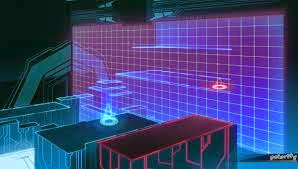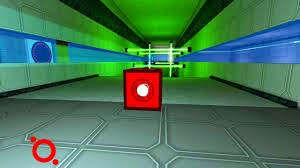I was a backer of the Ouya since the first day of the KickStarter campaign. The idea of a new console for less than $100 that focused mainly on obscure and experimental indie titles just sounded like it would be whole lot of fun. I finally got mine shipped to me last month, and I've been enjoying playing through the game demos. So far, there aren't many games on it, and most of them are Android ports, but there was one Ouya exclusive title that caught my eye almost immediately. A game called Polarity.
The name Polarity refers to the player's ability to switch back and forth between two different polarities, represented by the colors red and blue. This determines how you interact with several of the color coded game elements that make up many of the puzzles throughout the game. Early on, the chosen polarity is quite important, but towards the middle it is less so, as new puzzle mechanics are introduced that are polarity independent. Towards the end of the game it comes back as a major part as all of the tricks are combined.
As in Portal, each level of Polarity consists of a handful of rooms that you must navigate through to get to the end. The main point though isn't simply to get to the end, but to also collect the three data points in each level. These data points are floating green mists that you must walk (or jump, or fall) to and collect. Sometimes these are right out in the open, sometimes they are tucked off in out of the way corridors you might not think to look down right away, and sometimes they are easy to find, but require a lot of cleverness to get to. Some of the more challenging levels had me stumped bad enough that I had to come back to them later. Prepare to think in this game!
I do have to complain a bit about the controls. For the most part, they worked great, adopting the now standard console FPS gamepad layout. From time to time though, there was bad lag for a minute or so at a time. Not cloud streaming lag, or low on memory lag, but a two second delay between when you touch a control and when the game responds. I don't know if this is a fault of the game itself, or a general issue with my pre-release Ouya console, but I'm hoping it gets cleared up before the official launch, as I imagine I'll probably play through this game again at some point. It's short enough to invite replay. Maybe I'll try a speed run?
Overall, I found the presentation to be top notch, from the music to the UI, to the atmosphere in general. While most of the early Ouya games so far are full tongue-in-cheek self-aware satire or retro nostalgia, Polarity is one of the few that actually takes itself seriously, and one of the few so far to really make the Ouya feel like an actual console. Hopefully, this is a sign of things to come, both for the Ouya, and for BlueButton Games.


.jpeg)




No comments:
Post a Comment